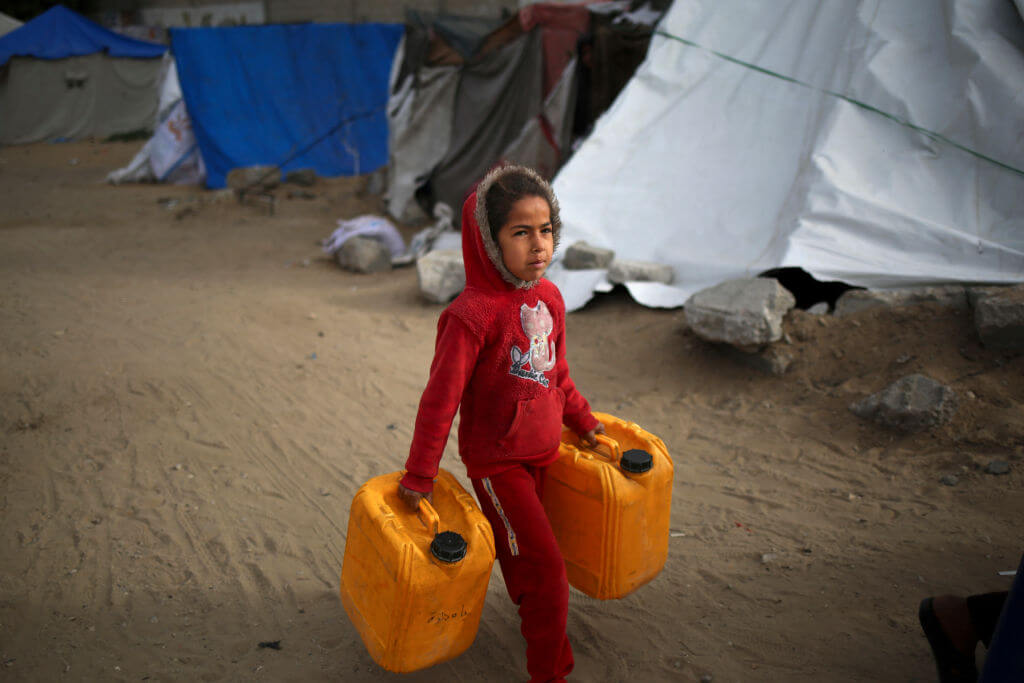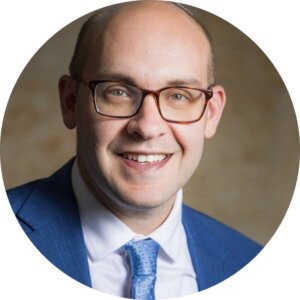100 Gazans were killed trying to get food. Jews should be outraged
Judaism demands we hold their suffering in our hearts alongside concern for Israel

A Palestinian girl carries water containers along a street in Rafah in the southern Gaza Strip on March 3. Photo by Getty Images
There’s a concept in Judaism that we should always keep two pieces of paper in our pockets, and pull each out when we need it. One says, “The whole world was created for me,” and the other, “I am but dust and ashes.” The idea is we’re supposed to be able to hold two competing impulses in our hearts.
For the past five months, my synagogue has been saying a prayer for the captives written by a rabbinical student at Hebrew Union College-Jewish Institute of Religion, Hannah Ellenson. It says we aim to “hold the humanity and heartache of the Jewish people, all the residents of the state of Israel, while holding the humanity and dignity of the Palestinian people.”
Some weeks, when we learn more about the events of Oct. 7, when antisemitism hits close to home, when we hear of a young soldier’s death, we highlight the first two clauses.
Last week, when more than 100 Palestinians in Gaza were killed trying to get food from a humanitarian aid convoy, I felt acutely the urgency of that second part. It reminded me of a story from the Yom Kippur War, a little more than 50 years ago.
Toward the tail end of that war, Israel somehow found a way to surround the Egyptian III Corps, which amounted to upwards of 30,000 fighters. As the story goes, the leaders of the Israel Defense Forces gathered the most important voices in Israel, including Torah scholars, together to study one simple question: Should they let food in?
Israel was fighting an existential war, a war they did not begin. The Egyptians in question were all soldiers. This was Israel’s enemy, and they had it surrounded. So the question amounted to: Do they use their resources to potentially strengthen the enemy army’s body?
They decided to let food, water and plasma for transfusions in. No Egyptian soldier starved — and eventually, they surrendered.
We do not know yet exactly what happened with the aid convoy in Gaza. We know that there were many people rushing toward the trucks and that some of the drivers got scared and drove away, running people over in the process. We know that some Palestinians got trampled in a stampede. And we know that some were shot by Israeli soldiers who say they were defending themselves from an oncoming mob.
We may never know how many of the casualties were in each of these categories, or which action triggered the others — and I’m not actually particularly concerned about these details. Horrible things happen in the midst of conflict.
The thing that I am concerned about is the fact that so many Palestinians are so hungry. That we as a people in the midst of war have forgotten the lesson of 1973 and that we are letting civilian people in Gaza starve so that they need to riot and trample one another.
Every year, I teach the 10th graders in our synagogue’s religious school. One of the sessions is about the dichotomy of universalism and particularism.
These are two forces that are in tension within Judaism. Universalism covers the ways in which Judaism is about the other; about helping the stranger. Particularism is how Judaism says we need to take care of ourselves first.
Every single year, I predictably sit with this young group of universalists, and I have to push the 10th graders to be a little more particularist.
This year, something different happened — I was sitting in a room of particularists. The Hamas attack on Oct. 7 has transformed them. Antisemitism in the public schools, on college campuses and in the streets, has transformed them.
It’s natural for 10th graders to be universalists. We adults, with a little perspective, are supposed to push them to balance that instinct with some particularism. But living in this world, I’m watching as the heartache that we as a Jewish people are going through is hardening our hearts toward the suffering of others. And our kids are no exception.
Protecting yourself, fighting Hamas, freeing the captives — these impulses do not mean that you cannot care about the humanity and dignity of the Palestinian people. And if we forget that, we forget it at our peril.
I pray with depth for those who are still held hostage, for their parents, for the soldiers who are still in harm’s way. I hope that they and all Israel figure out a way that they do not have to live in fear anymore.
And at the same time, you do not have to ignore the suffering on the other side or make excuses for it. You can hold both as true. They are both in your pockets, slips of paper you can take out at any time when you need to soften or harden your resolve.
This essay was adapted from Rabbi Katz’s remarks at Shabbat services on Friday night.
A message from our Publisher & CEO Rachel Fishman Feddersen

I hope you appreciated this article. Before you go, I’d like to ask you to please support the Forward’s award-winning, nonprofit journalism so that we can be prepared for whatever news 2025 brings.
At a time when other newsrooms are closing or cutting back, the Forward has removed its paywall and invested additional resources to report on the ground from Israel and around the U.S. on the impact of the war, rising antisemitism and polarized discourse.
Readers like you make it all possible. Support our work by becoming a Forward Member and connect with our journalism and your community.
— Rachel Fishman Feddersen, Publisher and CEO




























